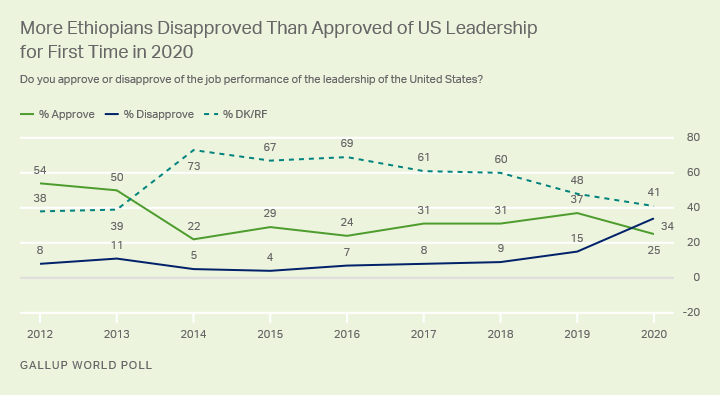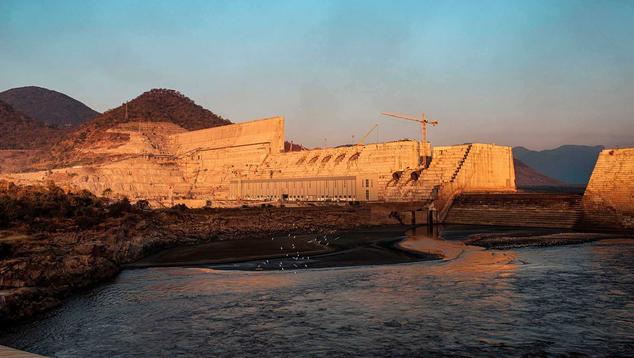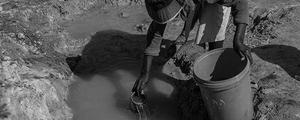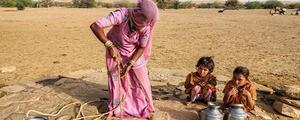Story Highlights
- 64% of Egyptians reported interruptions to water supply in past year
- More Ethiopians disapprove of U.S. leadership than approve for first time
WASHINGTON, D.C. -- Sudan's government last week asked the U.N. Security Council to meet and discuss the future of the Grand Ethiopian Renaissance Dam (GERD) as talks remain stalled between Ethiopia and downstream countries Sudan and Egypt. Sudan recently rejected Ethiopia's plan to refill the dam for a second time when the rainy season starts.
At the heart of the disagreement are concerns that Ethiopia's damming of the Blue Nile may harm both Sudan and Egypt's water supply, an issue Egyptian President Abdel Fattah el Sisi has described as "existential for all Egyptians."
In 2020, nearly two in three Egyptians said they experienced interruptions in their water source, including one in five (21%) for whom this occurred almost every month. Further, more than one in three (36%) worried in the past 12 months that there would not be enough water to meet needs, and 25% had no usable or drinkable water in their household.
| Almost every month | In some, but not every month | In one or two months | Never | |
|---|---|---|---|---|
| % | % | % | % | |
| Water source was interrupted | 21 | 35 | 8 | 35 |
| Worried you would not have enough water for your needs | 12 | 21 | 3 | 62 |
| Felt angry due to these problems | 11 | 24 | 3 | 61 |
| Changed schedules or plans | 8 | 17 | 4 | 70 |
| Changed what you ate | 8 | 16 | 3 | 72 |
| Had no usable or drinkable water | 8 | 14 | 3 | 76 |
| Could not wash clothes | 7 | 16 | 4 | 73 |
| Felt shame due to these problems | 7 | 16 | 3 | 74 |
| Did not have as much water to drink as would have liked | 7 | 13 | 2 | 77 |
| Could not wash body | 5 | 13 | 3 | 78 |
| Could not wash hands | 5 | 11 | 3 | 81 |
| Went to sleep thirsty | 3 | 7 | 2 | 88 |
| Household Water Insecurity Experiences/Gallup, 2020 | ||||
These data on Egyptians' experiences with water come from a partnership between the Gallup World Poll and Northwestern University, which implemented the Individual Water Insecurity Experiences (IWISE) scale to gain insights into how problems with water affect the daily lives of people all around the world.
Data from the IWISE demonstrate that water insecurity in Egypt is common occurrence even before the GERD is refilled. Egypt depends on the Nile River for 90% of its drinking water -- as well as the sediment it brings as a source of soil fertilization for its farms.
Even without GERD threatening to diminish the Nile's flow, Egypt's water system has buckled under the twin stresses of population growth and chronic mismanagement. A 2009 government report estimated that water conveyance efficiency stands at 70%; billions of cubic meters of water are lost each year because of leaks and inefficient irrigation techniques.
GERD's Importance to Ethiopia
The Nile is not only essential to Egyptians. The $5 billion GERD project promises to double Ethiopia's current electric output, which may allow the country to not only meet its current power needs but gain badly needed foreign currency through the sale of electricity to neighboring countries.
Increased electricity generation should help lift millions of Ethiopians out of poverty, drive economic growth, and meet a crucial need of the population: keeping the lights on. In 2016, the Gallup World Poll found that 44% of Ethiopians lit their homes with electricity from a power line, while 19% illuminated their homes with kerosene lamps and 11% with flashlights.
At that time, just five years into construction of the dam, Ethiopians said that "improved electricity" was the second most important priority for the government to address (15%), just after improved security (18%).
The dam's completion would represent a tremendous victory for Ethiopia's government and could serve as a unifying accomplishment in a country torn by ethnic divisions and civil war in the Tigray region. The project's potential to "rally the flag" was on display in late 2020 when the Trump administration froze aid to Ethiopia over the dam dispute and suggested that Egypt could bomb the dam if an agreement was not made.
Surveys in late 2020 suggest that Ethiopians soured on U.S. leadership in response, as more disapproved of U.S. leadership than approved for the first time since 2012.

Line graph. Ethiopians' views of U.S. leadership. In 2020, 25% approved of U.S. leadership, 34% disapproved and 41% did not know or refused to answer.
Bottom Line
The failure of Ethiopia and its downstream neighbors to reach an agreement on equitable access to Nile water carries with it potentially tremendous humanitarian and security consequences for the entire region. Already the second and third largest countries on the African continent, Egypt and Ethiopia are forecast to be among the 10 most populous countries in the world by 2100, putting heavy strain on limited water resources that climate change researchers say will get scarcer as the number of hot and dry years increases.
The GERD has the potential to create huge economic and developmental gains within Ethiopia or exacerbate a growing humanitarian crisis, depending on how it is implemented. If rules are not agreed to covering how the dam is operated and its vast reservoir filled, it may increase stress on already limited water availability in Egypt and Sudan.
A spike in the already significant water insecurity felt in Egypt could put many of the 28% of Egyptians who rely on agriculture out of work, drive up food prices, and destabilize the country's politics. The prosperity and survival of countries in the Nile Basin will depend heavily on the river's resources as GERD continues to cast a major shadow over both international and domestic politics. As Ethiopia prepares to fill the dam a second time in the coming rainy season, tensions will continue to run high.
Dr. Sera L. Young is an Associate Professor in the Department of Anthropology and Global Health at Northwestern University and a Carnegie Fellow.
To stay up to date with the latest Gallup News insights and updates, follow us on Twitter.
Learn more about how the Gallup World Poll works.




